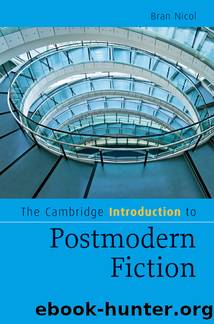The Cambridge Introduction to Postmodern Fiction by Bran Nicol

Author:Bran Nicol [NICOL]
Language: eng
Format: epub
Publisher: Cambridge University Press
Published: 2016-01-04T16:00:00+00:00
John Fowles, The French Lieutenant's Woman
Susan Onega has written about sending a letter to the academic and novelist David Lodge in 1983 asking for other examples of ‘pseudo-historical novels’ like Fowles's The French Lieutenant's Woman only for him to reply that he couldn't think of any. By 1990, the time of her paper about British pseudo-historical novels, the situation had changed dramatically, and the list of British novelists producing this kind of work was (as we have seen) extensive. But Fowles's novel was the pioneer.
At one level The French Lieutenant's Woman is an extraordinarily effective pastiche of the nineteenth-century realist novel, a form Fowles clearly admires. It is as if written by a composite version of George Eliot and Thomas Hardy. The French Lieutenant's Woman tells an engaging love story set in the beautiful Dorset seaside town of Lyme Regis in 1867. Charles Smithson, a wealthy Victorian gentleman, heir to a title, is engaged to marry Ernestina Freeman, daughter of a representative of the emergent middle class, a haberdasher keen to see his daughter marry into a family higher up the social scale. When the novel begins, their courtship is progressing according to the codes of propriety which operated at the time. Yet Charles becomes obsessively attracted to the mysterious Sarah Woodruff – known as ‘the French Lieutenant's Woman’ (or ‘whore’) by the people of Lyme – who is a social outcast because of the stigma of having had an affair with a French sailor, who has abandoned her. Her outsider status is signified by her habit of wandering around the symbolic ‘wild zone’ of the Undercliff, a counter-space to the domestic interiors where proper social intercourse is conducted.
Charles begins a disastrous relationship with Sarah, breaking off his engagement to Ernestina, and following her to a hotel in Exeter where they briefly have sex. Sarah then disappears, Charles's manservant Sam betrays him, and Mr Freeman makes him sign a humiliating document acknowledging his guilt and effectively condemning him to outcast status too. When he eventually tracks Sarah down, to a house she shares with the historically real Victorian artists, the Rossettis, he discovers she has changed considerably and finds this hard to accept.
Although Fowles professed to have no particular interest in the form of the historical romance, the novel is beautifully constructed, with a faultless replication of nineteenth-century patterns of speech and period detail, and rewards the kind of in-depth reading one might perform on a Hardy novel, noting the patterns in the narrative and decoding its underlying symbolism. Fowles once commented that the novel was, like its predecessors The Collector and The Magus, ‘based on more or less disguised existentialist premises’ and tried ‘to show an existentialist awareness before it was chronologically possible’ (Fowles, 1990, 151).
Sartrean existentialism (a philosophy to which Fowles adhered) begins with the recognition that human existence is pointless, as there is no inherent purpose to life and insists that one's responsibility is therefore to determine the meaning of one's life for oneself by making committed, responsible choices.
Download
This site does not store any files on its server. We only index and link to content provided by other sites. Please contact the content providers to delete copyright contents if any and email us, we'll remove relevant links or contents immediately.
| Ancient & Classical | Arthurian Romance |
| Beat Generation | Feminist |
| Gothic & Romantic | LGBT |
| Medieval | Modern |
| Modernism | Postmodernism |
| Renaissance | Shakespeare |
| Surrealism | Victorian |
4 3 2 1: A Novel by Paul Auster(11052)
The handmaid's tale by Margaret Atwood(6856)
Giovanni's Room by James Baldwin(5880)
Big Magic: Creative Living Beyond Fear by Elizabeth Gilbert(4723)
Asking the Right Questions: A Guide to Critical Thinking by M. Neil Browne & Stuart M. Keeley(4576)
On Writing A Memoir of the Craft by Stephen King(4215)
Ego Is the Enemy by Ryan Holiday(3991)
Ken Follett - World without end by Ken Follett(3974)
The Body: A Guide for Occupants by Bill Bryson(3802)
Bluets by Maggie Nelson(3711)
Adulting by Kelly Williams Brown(3671)
Guilty Pleasures by Laurell K Hamilton(3587)
Eat That Frog! by Brian Tracy(3514)
White Noise - A Novel by Don DeLillo(3436)
The Poetry of Pablo Neruda by Pablo Neruda(3367)
Alive: The Story of the Andes Survivors by Piers Paul Read(3312)
The Bookshop by Penelope Fitzgerald(3229)
The Book of Joy by Dalai Lama(3218)
Fingerprints of the Gods by Graham Hancock(3214)
